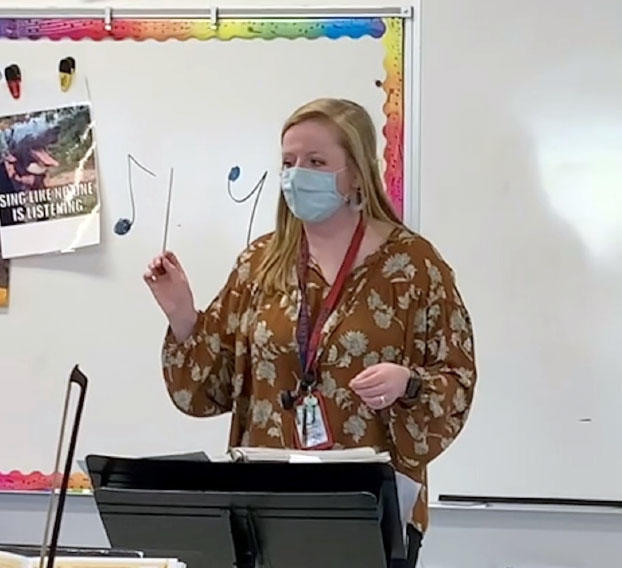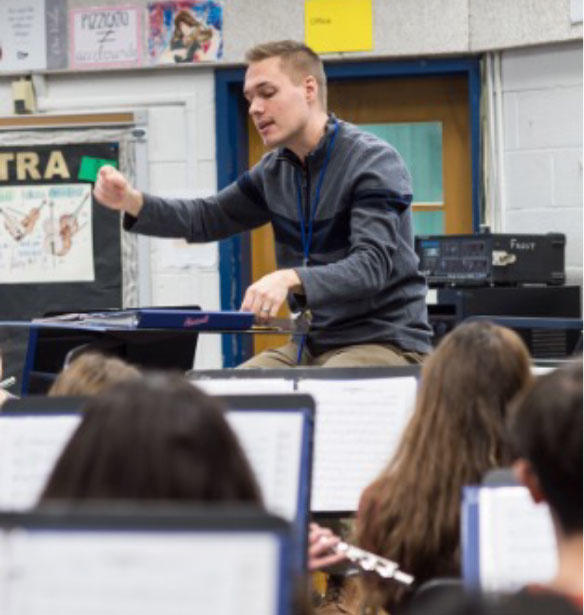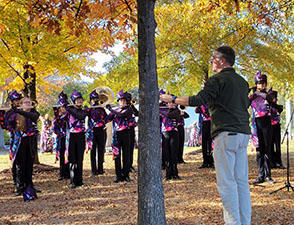In today's professional climate, George Mason University can boast nearly a 100% placement rate for our music education graduates.
Providing a high-quality education is key to our mission at George Mason, and our online courses are designed and taught by experienced George Mason faculty who are well-versed in the areas of teaching and scholarship.
We are dedicated to providing academic choices for today's music educators. The MM Concentration in Music Education (MUE) is currently offered in an online format. All required music education coursework is offered online in the fall, spring, and summer terms. Music education students have the opportunity, if they wish, to complete up to 9 elective credits on Mason’s Fairfax campus during one- to three-week intensive summer coursework. These summer intensive elective options include pedagogy coursework in Orff, Kodaly, and Jazz.
Watch videos below of a Day in the Life of Online Master's Students
Online Master's of Music Education Degree
Online Master's of Music Education Degree: Orff Option
Online Master's Degree of Education: Kodály Option
The Jazz and Music Education areas have combined to create an innovative degree designed for music educators who wish to develop and strengthen their jazz pedagogy knowledge. Students participate in the on campus “Jazz Intensive” (one week workshop) for three summers. The remaining coursework is completed online and includes the standard graduate music education curriculum, in addition to courses in Jazz Pedagogy, Teaching Improvisation, and more! Improve your teaching, develop your jazz pedagogy, and strengthen your playing!
We offer maximum flexibility, which allows you to complete the degree at your own pace. The choice is yours!
Degree Options Include:
- Online Master’s Degree: Non-Thesis Option
- Online Master’s Degree: Thesis Option
- Online Master’s Degree: Kodaly Option*
- Online Master’s Degree: Orff Option*
- Online Master's Degree: Jazz Intensive*
*Most classes are offered online, with the exception of the summer options offered in a face-to-face format.
Questions?
If you would like more in-depth information about the program, email Dr. Charles Ciorba, the program director, to set up an online meeting.
The Advantages of Studying Online
The Online Master of Music in Music Education is designed for busy working professionals.
You can pursue the program at the pace that makes the most sense for you and your life. This 30-credit program offers two fully online degree options (thesis and non-thesis), and three hybrid options which offer specialization in Kodaly, Orff, or Jazz Instruction.
This program is designed to offer our students the best value, no matter where they are in the United States or abroad. In-State and Out-of-State students pay the same tuition rate. For more information on tuition, please visit the Student Accounts Office.
Note:
When applying for the online or online/hybrid Master's degree in Music Education, be sure to choose the MOL (Master's Online) option.
Portfolio
Once students near the completion of the program, they will be required to submit a comprehensive electronic portfolio for final examination. Each portfolio will include a collection of student selected artifacts, as a reflection of their best work. Students will have the opportunity to (a) reflect on their growth over time and (b) determine how to apply their newly established knowledge in the classroom. This process will allow students to apply higher level understanding/thinking skills when considering the teaching and learning process.
Each portfolio will include:
- An introductory two-page (minimum) statement explaining how the portfolio items will be applied to the student’s daily teaching.
- A numbered and printed list of works submitted (including the student’s name and the title of the course in which the items were created).
- 10-15 examples of the work completed during the student’s time in the online program.
- Each portfolio will contain a variety of student work, including at least one artifact from each of the following areas:
- Aesthetics (Philosophy) of Music
- Psychology of Music
- Research
- Music History and Literature
- Music Theory
- Elective Coursework
- Orff Coursework (Orff hybrid students only)
- Kodaly Coursework (Kodaly hybrid students only)
- Portfolio Assessment
- Two faculty members, each representing different areas of expertise (e.g., Music Education, Music History and Literature, Music Theory), will assess each portfolio in a uniform and empirical manner.
What Do Our Online Graduates Have to Say?

“Pursuing my Master of Music Education degree at George Mason has been nothing short of incredible! As a teacher, I wanted a program that would balance challenging me and being manageable to keep up with while I am teaching full-time. This program has done just that. The coursework enlightens my current teaching practices and engages me in thoughtful conversations with George Mason faculty and fellow educators. The professors do a great job at honoring your commitment to current full-time teaching while furthering your education at the same time. I highly recommend to all music educators looking to take the next step in their career.”
Emily Goin, Henrico County Public Schools

"The online master’s degree program has provided me with the opportunity to think outside of typical day to day teaching responsibilities and consider the big picture. I’m more confident creating long term goals and incorporating best practices for student participation."
Daniel Tilman, Fairfax County Public Schools

“George Mason University's Online Master of Music Education program was ideal for me---the flexibility of scheduling and pacing made it possible for me to pursue my degree while continuing to teach full-time and serve as an officer in our state's Band & Orchestra Directors' Association. The coursework was challenging, stimulating, and informative, but also manageable in balance with my other responsibilities. I was able to complete all requirements for my master's degree within 28 months. I highly recommend this program for any working teacher!”
David Webb, Director of Bands, Jefferson Forest High School
